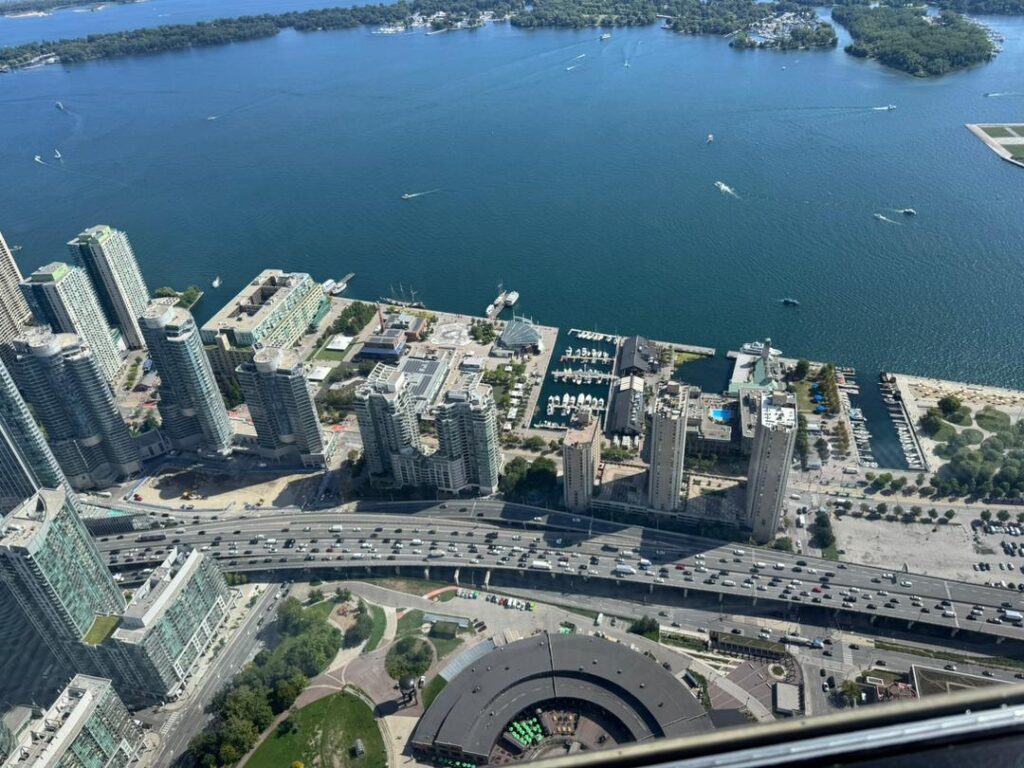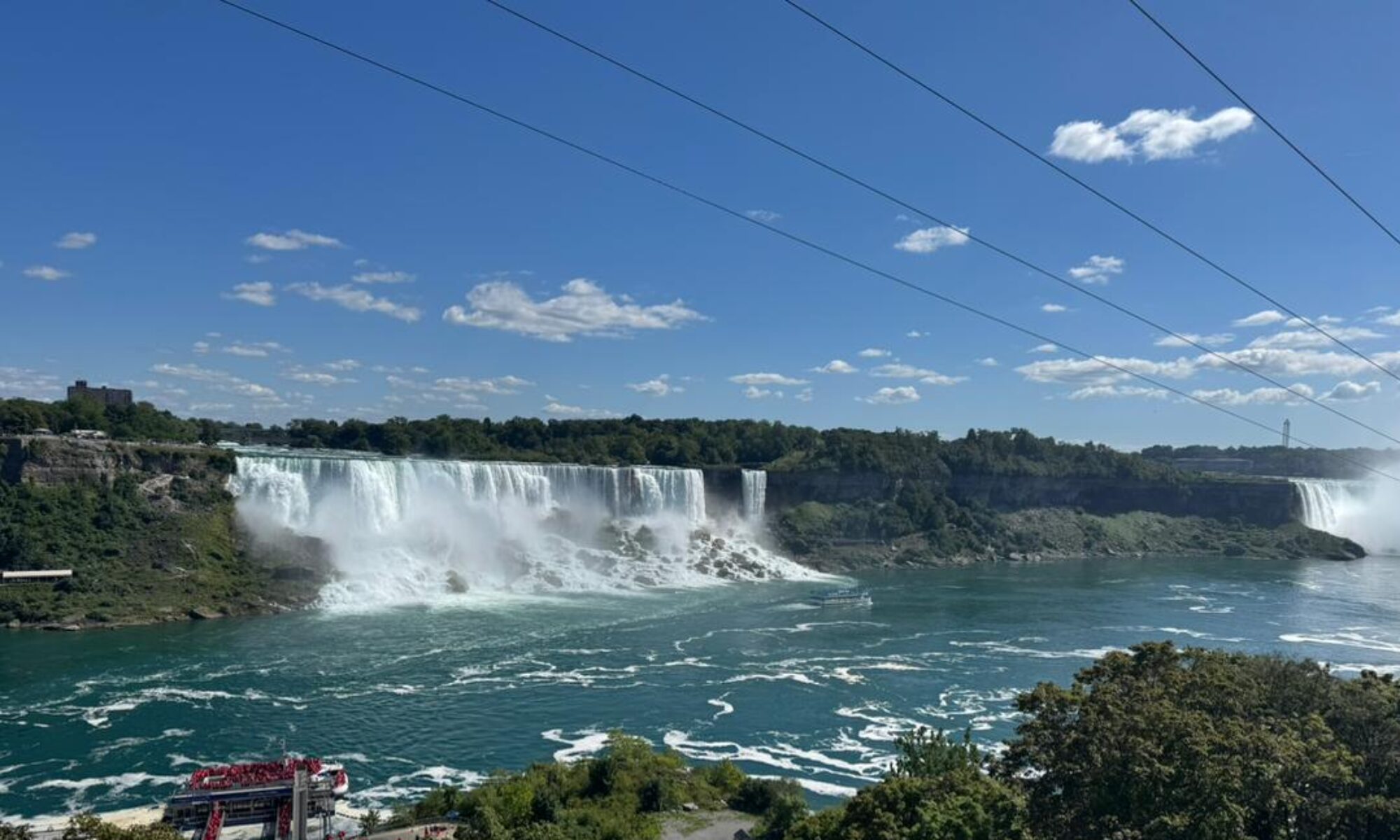
Picture Taken Inside CN Tower in Toronto on September 1, 2025.
Exploring My Progress with the Program Learning Outcomes in the MA in Human Rights and Social Justice
Throughout my journey in the Master of Arts in Human Rights and Social Justice (MAHRSJ) program, I have come to appreciate how the program’s learning outcomes are not simply abstract goals but living markers of my personal and academic growth. While each of the eleven outcomes has influenced my development, four stand out as particularly meaningful. These are: articulating and applying interdisciplinary theories and practices (PLO 1), demonstrating critical awareness of debates shaping human rights and social justice (PLO 2), showing critical awareness of ethical and intercultural frameworks (PLO 7), and demonstrating respect for Indigenous knowledge and wisdom (PLO 9). Reflecting on these outcomes, I realise how they have not only shaped my academic performance but also broadened my perspective on justice, knowledge, and community engagement.
Articulating and Applying Interdisciplinary Theories and Practices (PLO 1)
When I entered the program, I already had a strong philosophical foundation from my undergraduate and first master’s studies, but the MAHRSJ program challenged me to expand my understanding of human rights and social justice beyond a strictly philosophical or legalistic lens. Through courses such as Food, Arts, and Community Empowerment and Settler Colonialism: Decolonization and Resistance, I engaged with interdisciplinary perspectives that drew from law, political science, sociology, Indigenous studies, and lived experience.
A clear example of my growth in this area was my reflection work on Vandana Shiva’s Who Really Feeds the World? The book itself sits at the intersection of environmental science, economics, and social justice, and responding to it required me to integrate these fields into a coherent critique. In my reflections, I moved beyond the abstract moral theories with which I was initially most comfortable and applied interdisciplinary frameworks to understand food sovereignty and ecological sustainability as urgent human rights issues. This shift has allowed me to articulate my ideas with greater nuance, weaving together theory and practice in ways that reflect the complexity of social problems.
Demonstrating Critical Awareness of Past and Present Debates (PLO 2)
Closely related to interdisciplinary practice is the ability to critically analyze the debates that have shaped the field. One of the most valuable aspects of this program has been the emphasis on examining both historical and contemporary contestations around human rights and social justice.
The Mapping Place assignment in Settler Colonialism: Decolonization and Responsibility was a pivotal learning experience for me in this regard. In that assignment, I traced the colonial impositions embedded in local geographies and connected them with broader national and global debates on land, sovereignty, and Indigenous resistance. Engaging critically with these debates required me not only to recognize the persistence of colonial frameworks but also to understand the debates that continue to challenge them. For example, I came to see how mainstream human rights discourses often universalize principles in ways that overlook local and Indigenous understandings of justice.
Through these engagements, I have developed a sharper awareness of how past legacies, such as colonialism, imperialism, and racialized systems of law, continue to shape the present. More importantly, I have learned to approach these debates not as abstract academic disputes but as lived struggles that demand both intellectual critique and ethical responsibility.

The Iconic CN Tower in Toronto, Canada. One of the Tallest Freestanding Structures in the World.
Demonstrating Critical Awareness of Ethical and Intercultural Frameworks (PLO 7)
Perhaps the most transformative learning outcome for me has been the development of a critical awareness of ethical and intercultural frameworks. My academic training before this program emphasized universalist approaches to ethics, especially from Western traditions such as Kantian and utilitarian thought. While those frameworks remain valuable, the MAHRSJ program has expanded my perspective to include intercultural, relational, and community-centered ethics.
This shift became particularly meaningful during my coursework in Indigenous Ways of Knowing. The class challenged me to confront my own positionality and the assumptions I brought into ethical discussions. For instance, I had to rethink the role of individual rights in contexts where relational responsibilities to land, community, and ancestors are central. By engaging with Indigenous frameworks of reciprocity and respect, I came to appreciate that ethical awareness is not simply about applying abstract principles but about recognizing the cultural and historical contexts that shape moral life.
This outcome has influenced not only my academic writing but also my professional and personal interactions. In my role as a Research Coach for philosophy and ethics courses, I now approach classroom discussions with a greater sensitivity to the diversity of worldviews represented among students. I strive to create spaces where multiple ethical frameworks can coexist, be questioned, and be respected.
Demonstrating Respect for Indigenous Knowledge and Wisdom (PLO 9)
Finally, one of the most meaningful outcomes has been developing a respect for Indigenous knowledge and wisdom. This is not merely an academic skill but an orientation that I feel will shape my life well beyond the MAHRSJ program.
My experiences in the program have shown me that Indigenous knowledge is not simply an alternative perspective but a sophisticated and vital body of wisdom that challenges dominant paradigms of knowledge production. For example, during discussions of place-based knowledge in Settler Colonialism: Decolonization and Responsibility, I learnt how Indigenous relationships with land and water are deeply tied to community identity, resilience, and survival. This resonated with me personally, as I reflected on the cultural and spiritual relationships my own community in Nigeria has with land, rivers, and ancestral traditions.
What has been transformative is realizing that Indigenous knowledge is not “supplementary” to academic discourse but foundational to reimagining justice in ways that are sustainable, relational, and respectful. Engaging with this outcome has also prompted me to reframe my understanding of leadership. True leadership in human rights and social justice requires not only technical expertise but also humility, respect, and openness to wisdom traditions that may at first seem unfamiliar but are deeply valuable.
Conclusion
Looking back on my time in the MAHRSJ program, I can see that my growth is best reflected in the interplay between these four outcomes. Interdisciplinary application (PLO 1) allowed me to integrate multiple perspectives; critical engagement with debates (PLO 2) gave me historical and contemporary grounding; ethical and intercultural awareness (PLO 7) reshaped my orientation toward justice; and respect for Indigenous knowledge (PLO 9) deepened my appreciation of wisdom traditions beyond Western frameworks.
Together, these outcomes have transformed not only my academic competence but also my identity as a scholar, teacher, and advocate. I leave the program not simply with advanced knowledge but with a broadened vision of justice, one that is interdisciplinary, historically grounded, interculturally sensitive, and deeply respectful of Indigenous wisdom. These lessons will continue to guide me as I engage in future research, teaching, and advocacy for human rights and social justice at local, national, and global levels.

A Beautiful View from CN Tower, Toronto.
